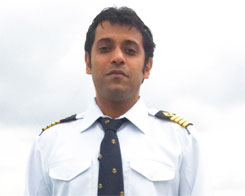 A woman knows the face of the man as a sailor knows the open sea
A woman knows the face of the man as a sailor knows the open sea
SOMETIMES, WHEN I look over my shoulder, it seems like yesterday. The day is imprinted in my memory: June 14, 1998. I stepped aboard “MT Zagara” at Ravenna, my first merchant vessel, as a 19-year-old cadet officer.
To say I was proud would be an understatement. I was so chuffed. I felt as if I had hitched my wagon to the stars and looked out at the horizon. Protocol took over as I headed for the Captain’s cabin to pay my regards. I still remember a tall, blue-eyed Italian looking at me to ask: “Where are you from?”
“New Delhi, India, sir.”
“Wow! Delhi has no seashore and you’ve come from there to join the Merchant Navy?’
Now was that a statement a question I was supposed to answer? I don’t know, but I recalled reading: “Some men are wise and some are otherwise”. Finally I had met “otherwise” and decided to just grin my way through for the moment.
“Hark, now hear the sailors cry, smell the sea, and feel the sky let your soul and sprit fly into the mystic seas and sky.”
The moment passed and my maiden voyage as a cadet had begun. Of course, I felt he had smashed a bottle of champagne on my head in the same manner one launches a ship.
A thousand thoughts echoed in my head. How I was dying to tell him that my love for the sea began as a young boy when I read R L Stevenson’sTreasure Island; then came Herman Melville’s Moby Dick and Joseph Conrad’s classic Typhoon. The sea has attracted many lovers of the written word and needless to say, I took to the sea like a fish to water – literally. I began by winning accolades and awards at school, soon after becoming the swimming captain for Modern School Delhi.
My adolescent imagination was aflame and I lusted after the great waters beyond the shores, so it came as no surprise to friends and family when I decided on a career in merchant navy.
What I did not bank on was being the only Indian cadet on board. The rest of the crew was a motley crew of Italians, Romanians and Russians. It meant I had to adjust to an alien environment. The first few months on board were not all wine and roses. At every step, I was forced to prove I was as good as I gave, and six months later no one else could hope to find me lagging behind.
“Indians never make good officers!” was the unvoiced opinion aboard the Zagara. What hope was there of a cadet breaking this mindset? Six months of backbreaking work, spit-and-polish and nose to the grindstone, and I left no one in doubt as to what I wanted to prove. This was for real. And I meant business.
All this, of course, was many years ago — 1998 to be precise. Seventeen years later, a lot has changed. The joke is on the others now. Indian sea-farers onboard merchant vessels, in the deep blue sea, attract much more than respect from foreign nationals.
You could repeat to me that old saying I learnt at school, one which our moral science teacher used to drill into us at the school assembly every morning: “Slow and steady wins the race!” That, dear reader, has been my tale. I worked up the ladder. In 2009, I got my Command and became a Captain. One thing, though, stuck out like a sore thumb. A 31-year-old, and an Indian Commander at that, giving orders, did not go down too well with many. But this time around, they had no choice. Fall into line, obey and execute!
While I have been fortunate to have worked with various nationalities from East Europe and Far East, I have never let the tilted behaviour of my crew towards an Indian crew on board cloud my decision or be unreasonable towards them because of their nationality — something I learnt early on the job as a junior officer.
Last year, while approaching Kobe, a port in Japan, a marine pilot boarded the vessel. Surprised as he was to see a young Indian Captain in command of the vessel, he didn’t say anything but before disembarking the ship he commented: “Captain Bakshi, you seem to be a fine Commander.” That, from a Japanese, who are known for their work ethics, made me realise I was doing something right.
Today, when I set sail around the world with my crew, I make it a point to tell my Indian crew and officers to give their best, always nothing but the best. Sometimes, only sometimes does one miss home and hearth. At times like this, I find solace in the belief that life is like the ocean, it can be calm or still, rough or rigid, but in the end it’s always beautiful.
